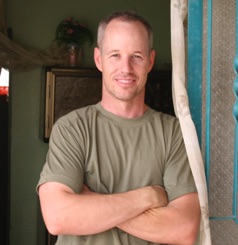
This fall, the Center for History Of Medicine at Washington University School of Medicine in St. Louis will host a series of programs featuring David J. Morris, a leading authority on post-traumatic stress disorder (PTSD).
The first of three programs will be held at 5:30 p.m. Oct. 3 on the university’s Danforth Campus. The other programs will be held on the Medical Campus at 8 a.m. and at 4:30 p.m. Oct. 4. All events are free and open to the public.
The former Marine infantry officer became a journalist and was embedded with U.S. military forces in Iraq from 2004-07. On his third reporting trip in Iraq in October 2007, the Humvee he and soldiers from the First Infantry Division were riding in was struck by a roadside bomb.
Although he escaped without physical injury, Morris’ struggle to recover from a debilitating mental state resulting from that traumatic experience, and his subsequent diagnosis of PTSD, led him on a quest to discover everything he could about the disorder.
His 2015 book, “The Evil Hours: A Biography of Post-Traumatic Stress Disorder,” details his journey of discovery. Much more than a memoir, Morris uses his personal insights to view PTSD through a cultural, historical and scientific lens, and infuses the voices of other sufferers with his own, as well as those in the medical and mental health professions who treat the disorder.
“The Evil Hours” was a New York Times Book Review Editor’s Choice and a Los Angeles Times Book Prize Finalist.
While Morris’ book focuses on war veterans and the development of therapies used by the Veterans Administration, he points out that PTSD is by no means confined to those in the military. As many as 27 million Americans are believed to suffer from PTSD as a result of experiencing severe trauma. The disorder is especially prevalent among survivors of sexual assault.
His articles have been widely published, including by The New Yorker, The New York Times and the Los Angeles Times. Read more about Morris and his writing.
Morris earned a bachelor’s degree in history from Texas A&M University; a master’s degree in fiction writing from the University of California, Irvine; and a master’s degree in British literature from San Diego State University. In 2008, he received a creative nonfiction fellowship from the National Endowment for the Arts.
Morris is an assistant professor of English at the University of Nevada, Las Vegas, where he teaches literary nonfiction.
Schedule of Events
Tuesday, Oct. 3: “PTSD in Military and Civilian Life”
5:30 p.m. Anheuser-Busch Hall, Room 310 (Danforth Campus)
The Assembly Series event features Morris in conversation with Tonya Edmond, associate professor in the Brown School and an authority on sexual assault interventions; and James Petersen, clinical social worker with the VA St. Louis Health Care System. A book signing will follow.
Visit the Assembly Series website for the rest of the Assembly Series’ fall schedule; visit the Parking and Transportation website for directions and parking information.
Wednesday, Oct. 4: “PTSD: Current Concepts in Treatment”
8-9 a.m. Clopton Auditorium, Barnes-Jewish Hospital (Medical Campus)
Panel discussion featuring Morris in conversation with clinical psychologists Kara O’Leary, Sarah Shia and Brittany Jacobson with the VA St. Louis Health Care System.
Wednesday, Oct. 4: “What We Talk About When We Talk About PTSD”
4:30-5:30 p.m. N. Medical Building, Moore Auditorium (Medical Campus)
Morris will deliver the 58th Historia Medica Lecture, presented by the Center for History Of Medicine
For the Oct. 4 events, visit the center’s website for directions and parking information or contact Robert Feibel.
Sponsors
The Center for History Of Medicine at Washington University School of Medicine is the lead sponsor of the Morris visiting lectureship. Co-sponsors include the university’s Brown School, School of Law and Assembly Series; and the Medical Staff Association of Barnes-Jewish Hospital.
The Center for History Of Medicine stimulates scholarship on how progress in medicine, science and engineering has taken place. The center brings together the historical collections of the Bernard Becker Medical Library and the outstanding scholars, broad knowledge and continuing discovery at the School of Medicine.